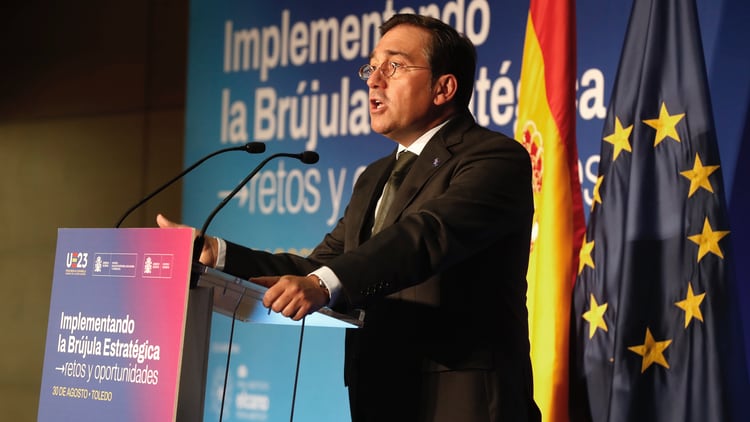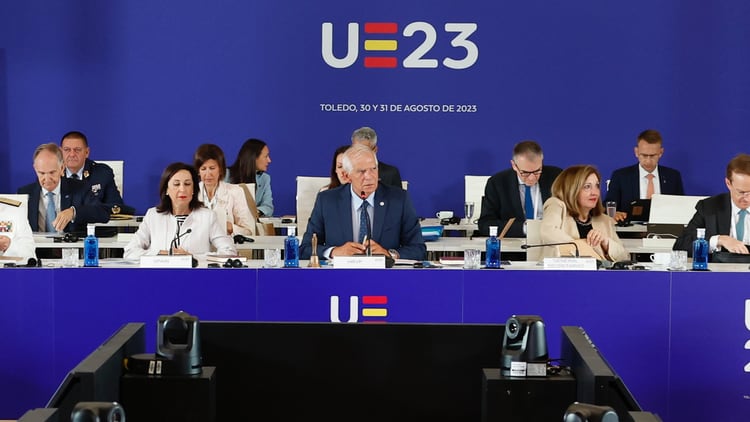The Diplomat
The acting Minister of Foreign Affairs, José Manuel Albares, yesterday warned of the “serious challenges to security and stability” around the Union, citing areas such as what happened in Niger after the coup d’état, “which highlights the relevance” of consolidating security in Europe.
During the opening ceremony of the seminar ‘Implementing the Strategic Compass: challenges and opportunities’ held in Toledo, he stressed that in the face of “the threat from Russia” in territories such as Ukraine or the Sahel, it is necessary to consolidate “lines of defence to contribute to greater security” for all partners.
“Commitment and solidarity on the ground as a means of building trust whenever possible”, he said, as is the case, in his opinion, with the European mission in Armenia, adding the need to “prevent the spread of violence” in the Gulf of Guinea, from where “worrying news is coming from Gabon” following the recent coup d’état, reports Europa Press.
Albares said that the seminar is relevant at a “decisive” time for Europe, and in the framework of informal meetings between defence and foreign ministers to address the challenges in Ukraine and the Sahel, he considered that the geopolitical scenario has state and non-state actors that require the European Union to be “a global actor” in the search for a “seamless and unprecedented” union.
The so-called Strategic Compass has taken the form of “a document that combines actions and goals and allows for the development of a common diagnosis of the threats and challenges facing the Union”.
It also seeks to “bring coherence to EU action in security and defence matters”, as well as experience and lessons learned with a view to “adapting to a new reality marked by Russian aggression, and also by the questioning of the EU’s values and the principles of the rules-based international order”.
The result of this reflection are the proposals aimed at making mission mandates more flexible, as well as “a strategy that adapts to changes in the situation”, to which it has added rapid deployment actions or “action strategies to protect common freedoms” such as “freedom of negotiation”, are some of the “capabilities” of this Compass.
The development of a defence industry conceived from Europe has a Spanish role whose perspective is based on the premise of “promoting” this industry as an indisputable factor for “turning the EU into a security provider”.
Promoting EU partnerships in security matters is “crucial”, according to Albares, who pointed out that Spain has always promoted synergies between the Union and NATO, something that “has been demonstrated” against the backdrop of Ukraine.
He also called for “continuing to develop the geographical dimension of the Compass” with an approach that “takes into account the priority of support for Ukraine”; but that “also contemplates existing challenges in key regions such as the Sahel”, whose future “is linked” to the EU.
“Security is a precious commodity, but one that we cannot take for granted, which requires the backing of the political will of governments to provide security for countries and citizens,” said Albares, who stressed the importance of having a guide such as the Strategic Compass, “a fundamental step towards a stronger Europe and closer European integration”, he said.
Robles: “We must invest in defence”
The acting Minister of Defence, Margarita Robles, also took part in the opening ceremony, picking up on Albares’ theme, stressing the premise that had already been raised throughout the day of the informal meeting of defence ministers in the city of Toledo, calling for continued support for Ukraine.
Robles paid tribute to the more than 3,000 men of the Spanish Armed Forces, and the European Armed Forces by extension, who are “risking their lives and defending important values” in different missions.
“Recognition, pride and admiration for them and their families”, said Robles, who mentioned some geopolitical situations, such as in Lebanon or Mali, where there are displaced contingents, all of whom are “objects of pride” for their countries.
Nevertheless, she expressed her pride in the situation of the defence industry in Spain, calling for continued support for the sector at the continental level, given that the war in Ukraine “has highlighted the vulnerabilities”.
It is necessary to “invest in defence” so that democratic values are consolidated, according to the minister, who insists on a “strong and consistent” industry.
“Because we believe in peace and democracy, we are committed to security and defence policies,” she said, addressing those who reject these investments and urging them to think about the employment they generate.
On another matter, he expressed his support for the EU High Representative for Foreign Affairs and Security Policy after the “insults received” from Russia, taking the opportunity to show his support and solidarity.
She also defended the complementarity of the EU and NATO in tackling global challenges, and expressed her “satisfaction” with the “institutional stature” of all member countries in this context.
“The European Union must be reindustrialised. We are firmly committed to this policy”, she concluded.







